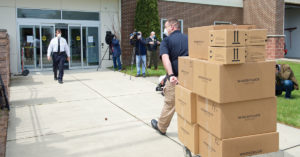 (Camden, NJ) – The global pandemic caused by COVID-19 has had a significant financial impact on municipalities throughout Camden County. Local governments across the board have been under pressure to purchase vital personal protective equipment (PPE), hand sanitizer, and a variety of other tools for essential employees since the start of this public health crisis. To alleviate some of these costs, the Freeholder Board received, and is allocating, federal funding for towns which will be used to supplement unforeseen costs that have been attributed directly to their operational budget.
(Camden, NJ) – The global pandemic caused by COVID-19 has had a significant financial impact on municipalities throughout Camden County. Local governments across the board have been under pressure to purchase vital personal protective equipment (PPE), hand sanitizer, and a variety of other tools for essential employees since the start of this public health crisis. To alleviate some of these costs, the Freeholder Board received, and is allocating, federal funding for towns which will be used to supplement unforeseen costs that have been attributed directly to their operational budget.
Freeholder Director Louis Cappelli Jr. described the federal funds as critical to governmental operations.
“Anyone working in government today knows we have seen a stark change in how we operate, and we have had to account for the costs of PPE, testing, and additional unforeseen needs at a scale we never would have pictured just five months ago,” Cappelli said. “This funding is going to be necessary for our towns’ budget cycles, whether it is used for EMS overtime or to reimburse the outfitting of municipal buildings for public business in a safe manner.”
In total, municipalities in Camden County will receive $3.2 million in grant funding. Winslow Township Mayor, Barry Wright, talked about the importance of the grant to his operation.
“The pandemic and resulting economic shutdown dealt a direct blow to the ability of municipalities and local governments to generate revenue,” Wright said. “This relief will enable us to close the budget gap created by COVID-19, ensure the continued availability of critical services and resources, and maintain the quality of life of our residents. We are thankful for the Board of Freeholders’ support and dedication to this community. This partnership will be critical as we prepare for both the short- and long-term economic ramifications of this crisis.”
Congressman Donald Norcross worked with his colleagues in the House of Representatives to pass the Coronavirus Aid, Relief, and Economic Security (CARES) Act.
“We are still in the midst of a grave health emergency, and our local governments urgently need relief,” Norcross said. “The CARES Act passed by Congress provides our counties and towns with the critical federal resources needed to help cover unexpected costs from the coronavirus pandemic and keep our first responders and other essential workers safe and on the job. I will continue to fight for South Jersey in Congress to ensure our communities get the tools and supplies we need to combat this outbreak and keep residents healthy and secure.”
The CARES Act was a trillion-dollar economic relief package to protect the American people from the public health and economic impacts of COVID-19. The law was signed into law in late March, having been passed by Congress with overwhelming, bipartisan support.
The CARES Act requires that payments from the Coronavirus Relief Fund only be used to cover expenses that:
- Are necessary expenditures incurred due to the public health emergency with respect to COVID–19;
- Were not accounted for in the budget most recently approved as of March 27, 2020 (the date of enactment of the CARES Act); and
- Were incurred during the period from March 1, to December 30, 2020.
Merchantville Mayor, Ted Brennan, said the funding was coming at the right time for municipalities.
“This is a direct stimulus to the residents of Merchantville, providing our municipality with the ability to maintain services without increasing the cost borne by our taxpayers,” Brennan said. “The county’s support has been essential to our ability to navigate the public health aspect of this pandemic, and this assistance will be equally crucial as we respond to the fiscal repercussions that accompany it. Protecting our municipality and our residents will require a whole of government approach, and we are incredibly grateful that the Freeholder Board has chosen to offer their reinforcement and collaboration.”
This will be part of the ongoing distribution of grant funding by the Freeholder Board to towns, healthcare institutions and small businesses over the next month.
